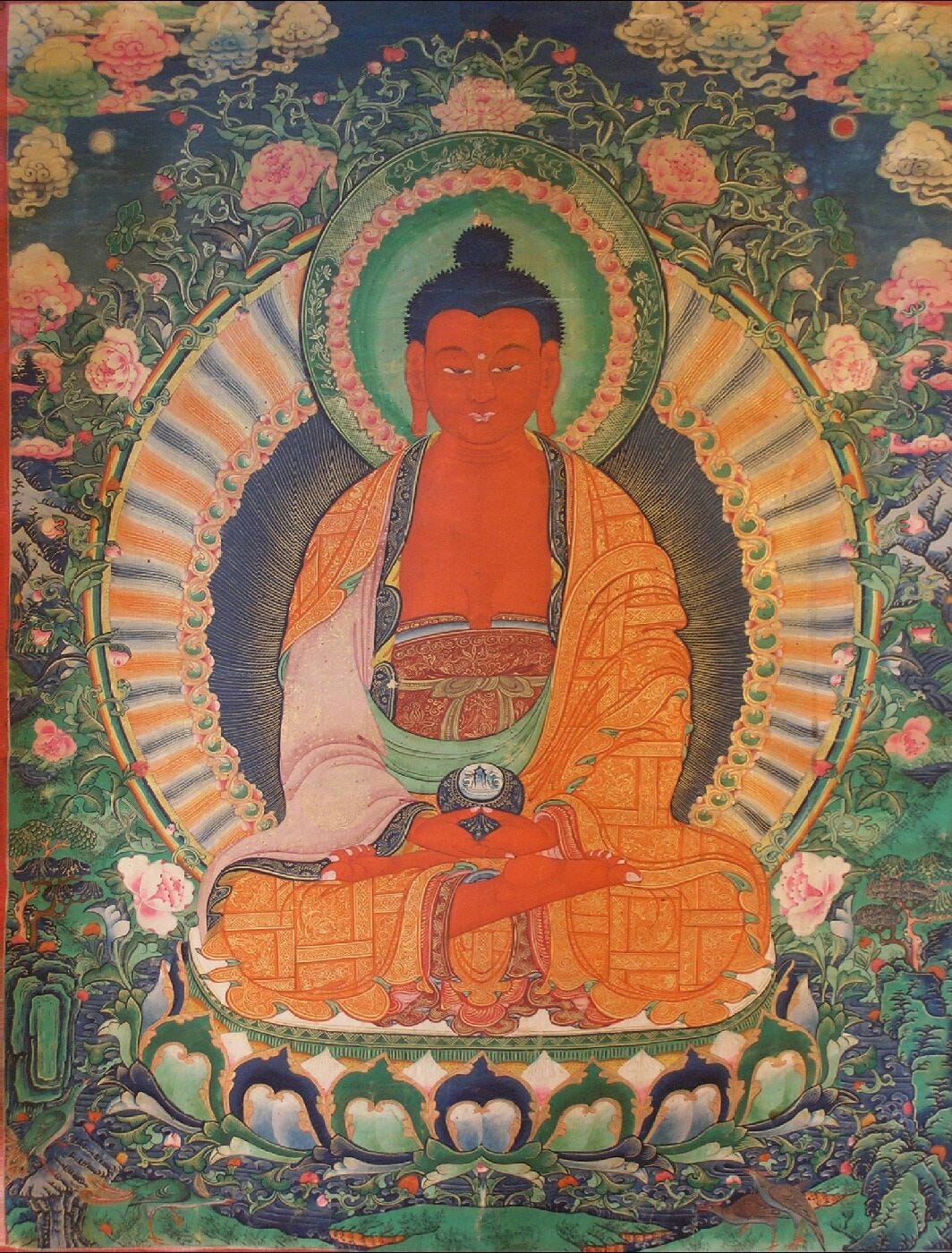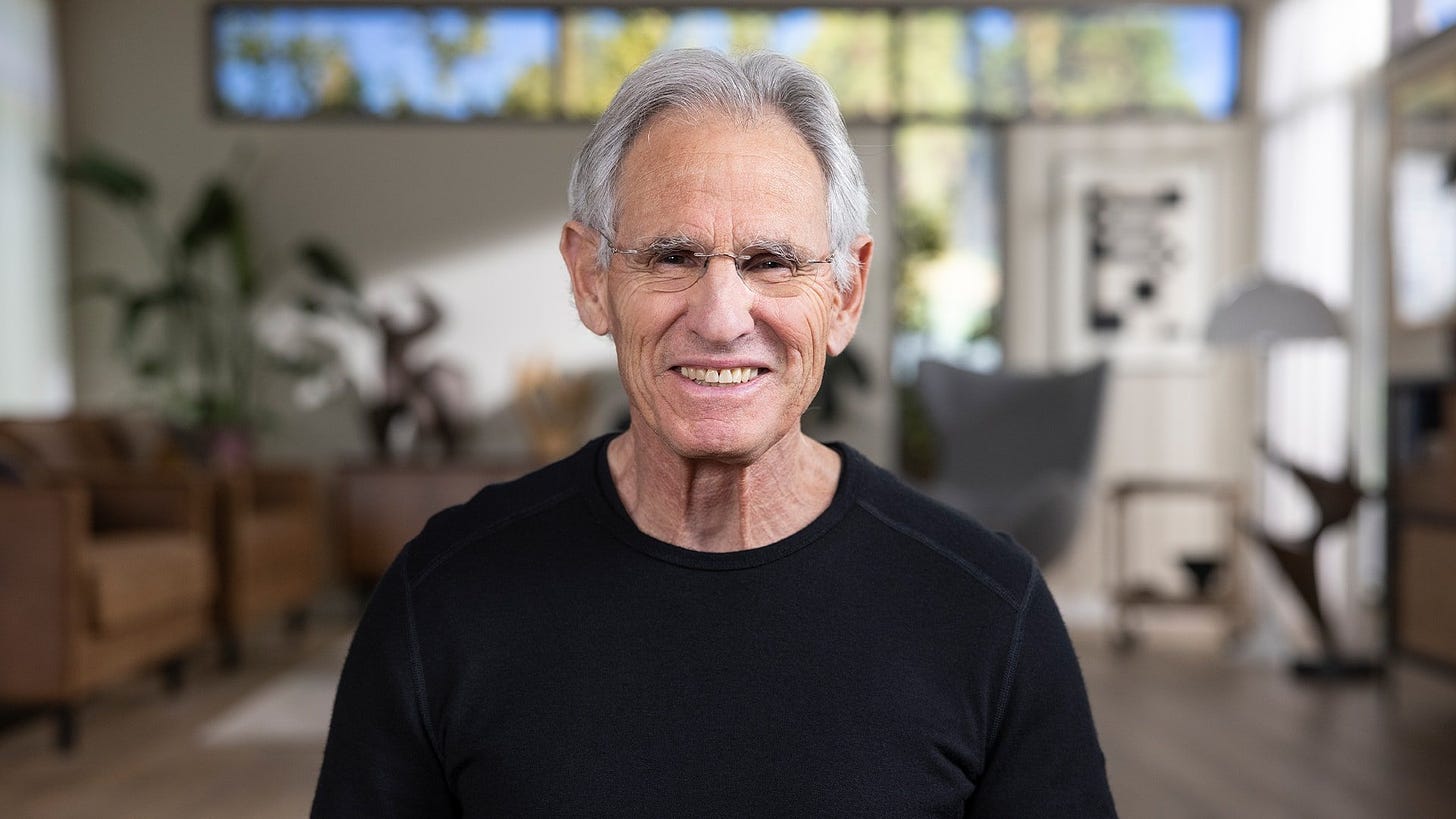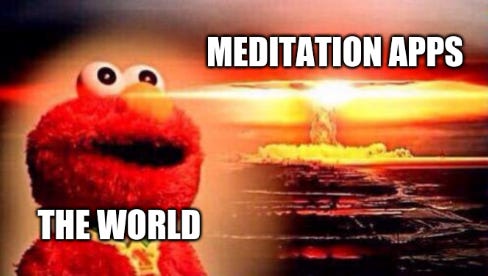The Mindfulness Boom - Why Are All Your Friends Meditating? 🧘🏻
How mindfulness broke into the mainstream.
Hey y’all!
Wilson here with the second edition of Right In Your Mind.
If you missed the first one - here it is:
Thanks so much for the support on the first piece. I appreciate each and every one of you.
Otherwise - if you haven’t subscribed yet - the button’s right here 😉
This week - we’re talking ✨🧘🏻 mindfulness 🧘🏻✨.
Deep Dive🤿: Mindfulness🧘🏻
A bit over 10 years ago - meditation apps were completely off the radar.
Sure - research was booming behind the scenes, and papers were being published - but to the mainstream, the space was almost invisible.
⏩ Fast forward to today, and you can’t have a conversation without mindfulness or meditation being brought up.
What’s the deal?
What Even Is Mindfulness?
Mindfulness and meditation get mixed up a lot.
While mindfulness is 1:
“awareness of one’s moment-to-moment experience non-judgmentally and with acceptance.”
meditation, yoga, etc. are just ways of achieving this (at least in the Western sense).
For the rest of piece - we’ll take mindfulness as referring to:
a collection of techniques to help you achieve the state we just described.
As it turns out - mindfulness isn’t anything new (but you probably already knew that).
The Illustrious History Of Mindfulness (And How It Got ‘Cool’ With Science).
Mindfulness practice can be traced back to Hinduism and Buddhism.
Hinduism’s been around for at least 4000+ years, and Buddhism has been in the history books since 400-500 BCE - so it’s definitely not a modern invention 2.
Thing is - mindfulness looked very different back then to what we see today.
Instead of a standalone tool for stress reduction - in Buddhism - Sati (mindfulness) is just one component to becoming enlightened.
The real question is - how did such a profound, subjective, (and a tad religious) practice get mainstream in the West?
Well, it’s because science finally studied it.
In the 1950s - ☯️ Zen Buddhism ☯️ was the cool kid on the block in the US.
Everywhere you looked - a new book was being published:
Zen in the Art of Archery (1953)
The World of Zen: An East-West Anthology (1960)
The Method of Zen (1960)
This got psychoanalysts excited about using meditative techniques with psychotherapy. The idea that we could broaden the boundaries of consciousness - and heighten awareness was an absolute treat (especially to Freudians).
This really picked up in 1975 - with Jon Kabat-Zinn.
Kabat-Zinn had an Eastern background in mindfulness and meditation - being taught by teachers like Thích Nhất Hạnh (who was famous in his own right for being “The Father of Mindfulness”). Wanting to bring his practice to the mainstream, Kabat-Zinn launched a program studying mindfulness and its effects on pain relief.
“Mindfulness-Based Stress Reduction” (MBSR) was an instant hit (and it worked). 🎯
Within a few decades, this spawned several other mindfulness-based interventions:
Mindfulness-Based Cognitive Therapy (MBCT)
Dialectical Behaviour Therapy (DBT)
Acceptance and Commitment Therapy (ACT)
Research boomed in the field, increasing by 22,133% in papers published from 1996 to 2016.
Wow. 🤯
Ok. What does the research say?
Well - a lot.
Correlation research studies have found 3 links between trait mindfulness and:
higher levels of life satisfaction
conscientiousness
self esteem
etc…
as well as negative correlations with:
depression
neuroticism
social anxiety
… and it goes on.
Need I go on?
This doesn’t even include extensive research into mindfulness-based therapies (they’re moderately effective in acutely treating both anxiety and depression).
Mindfulness really works (according to current research). 🥳
So, what if companies took mindfulness and distributed it to everyone? (jk… unless?)
The Meditation App Boom
Backed by research - meditation became a big trend in the 2010s - with Headspace and Calm slowly, but steadily growing in popularity.
Then 2018 hit. The Meditation App Boom was here.
This industry grew by over 306% in 2018-19, with the combined revenue of Calm + Headspace growing from $70mil to $122mil 4.
In particular - Calm took a celebrity endorsement approach. Soon enough - you had LeBron James, Ellie Goulding, Harry Styles and Shawn Mendes playing music or hosting meditation sessions.
Meditation was now cool. 😎
And then, Covid hit. 🦠
As it turns out - one of the biggest losses for humanity became a huge win for the meditation industry. Mental health became more of a focus than ever in society - and mindfulness was a suitable hammer for this particular nail.
In 2021, mindfulness and meditation are growing faster than ever.
The biggest players in the space are still:
Calm
Headspace
Insight Timer
Simple Habit
Waking Up (with Sam Harris)
Although, in the future - watch the trends on group meditation as well (e.g - Chorus in YC’s W21 Cohort).
So… should you meditate?
Yes.
Straight up.
If you’re looking to start - guided meditation is your best bet. Take care of your mental health yo! 💜
Check these out to easily get started!
Roundups and Happenings 🎠
Here’s some going-ons this week:
🤖 Revitalist has acquired Revitaland to build out virtual clinics in the metaverse. And yes - it works. A peer-reviewed study by Oxford showed a 38% decrease in anxiety and avoidant symptoms over 6 weeks with automated VR therapy.
💻 FDA has granted Pear Therapeutics “Breakthrough Device Designation” for their 'Prescription Digital Therapeutic’. It’s a prescription software product called reSET-O.
🪙 Gratitude Lodge, a rehabilitation & mental health treatment centre is now accepting cryptocurrencies as a payment method. Hell yeah to accessibility!
💸 Research And Markets released a report on the global Mental Health Software Industry. The global market is projected to reach US$3.7 billion by 2027 with an annual growth rate of 13%. (Maybe we’ll come back to this next week!)
💰 On the same train - ieso, an AI-enabled therapy startup, has just raised $53 million in a Series B. They’re seeking regulatory approval for the US / UK at the moment.
Actions 🎯
Couple cool opportunities this week:
Journey - is looking for a Marketing Director to scale its preventative mental health platform.
Osmind - is looking for a Head of Demand Gen to reach more healthcare providers and a Content Marketer to drive content creation about the issues providers/patients are facing in the current healthcare system.
Arli - is looking for a Head of Product to build up their addiction management platform.
And that’s that!
If you enjoyed this - please share it with a friend :)
I’d love to get your feedback on how we can make Right In Your Mind better.
Leave a comment, shoot me an email, and let me know what you think!
👋🏻 Wilson
https://www.ncbi.nlm.nih.gov/pmc/articles/PMC3679190/
https://positivepsychology.com/history-of-mindfulness/
https://www.ncbi.nlm.nih.gov/pmc/articles/PMC3679190/
https://www.businessofapps.com/data/calm-statistics/








